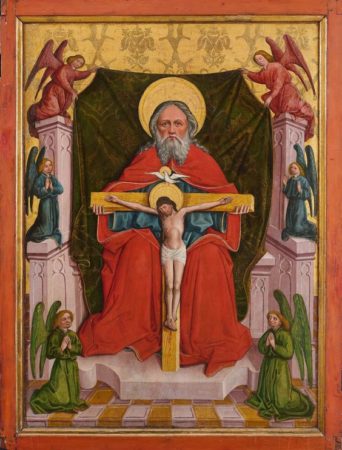Podcast: Play in new window | Download
Subscribe: Spotify | Email | RSS

In this and the next episode I respond to a critique of my views by apologist, author, and pastor Dr. Michael Burgos in an episode of his podcast. We discuss Old Testament monotheism, Paul’s monotheism, and the New Testament use of “Lord” (Greek: kurios) for both Jesus and for God. This conversation began as a conversation between him and me on Twitter.
I agree with Dr. Burgos on several points that he makes about the famous Shema (Deuteronomy 6:4) and about Paul’s discussion of food offered to idols in 1 Corinthians 8.
But there is plenty to disagree about as well. I argue that New Testament monotheism is not only the claim that there’s only one god, but also includes the claim that this one God just is the Father. I also argue that Dr. Burgos’s claim that “Lord” is “a title of deity” is either trivially true or obviously false – either way, of no help in interpreting Paul’s remarks in 1 Corinthians 8:4-6. Like other biblical unitarian Christians, I claim that the key to understanding the innovative New Testament usage of “Lord” is the much cited Psalm 110:1, which in Greek translation features two who are referred to as “Lord” (or more precisely, “the Lord,” i.e. God, vs. “my Lord,” i.e. the human who is here being exalted by God).
I also discuss his newfangled reading of 1 Corinthians 8 which imagines that Paul is there “reformulating the Shema,” and why unitarian Christians think that the Father is the one creator of the heaves and the earth.
Links for this episode:
- One God and One Lord: A Response to Dale Tuggy & a Consideration of 1 Corinthians 8:6
- Our God is Triune: Essays in Biblical Theology
- Counterfeit Religion: A Biblical Analysis of Select Cults, Sects, and False Religious Movements
- Against Oneness Pentecostalism: An Exegetical-Theological Critique
- Deuteronomy 6:4; 1 Corinthians 8:4-6 (different translations of 1 Corinthians 8:6); Isaiah 43:10; Genesis 1:26; Revelation 4; Revelation 5; Philippians 2:9-11; Mark 12:28-34; Psalm 110:1; Mark 10:6; Mark 13:19; Romans 1:20; Acts 4:24; Acts 14:15; Acts 17:24-31; Hebrews 11:3; Ephesians 3:9; 1 Timothy 4:3-4; Revelation 4:11; Revelation 10:6; Revelation 14:7.
- podcast 248 – How Trinity theories conflict with the Bible
- How Trinity theories conflict with the New Testament
- Dunn on Jesus as kyrios (“Lord”) in the New Testament
- divine simplicity
- podcast 164 – On Counting Gods (paper)
- one-self Trinity theories
- three-self Trinity theories
- Does the Old Testament Teach the Trinity? Jonathan McLatchie vs. Carlos Xavier
- podcast 131 – 10 Apologists’ Mistakes about the Trinity – Part 1
- podcast 132 – 10 Apologists’ Mistakes about the Trinity – Part 2
- podcast 227 – Who Should Christians Worship?
- The Orthodox Formulas 2: The Council of Constantinople (381)
- The Tuggy-Brown debate: Dale’s opening statement
- podcast 15 – Are Paul’s “one God” and “one Lord” one and the same?
- podcast 16 – How is Jesus “the one Lord”?
- podcast 224 – Biblical Words for God and for his Son Part 1 – God and “God” in the Bible
- podcast 225 – Biblical Words for God and for his Son Part 2 – Old “Lord” vs. New “Lord”
- podcast 253 – The Apostle Paul a Unitarian
- Splitting the Shema: A ‘How Not To’ guide
- fulfillment fallacy posts: the Bible teaches that David is God, the Bible on another previous life of Jesus
- podcast 258 – Who is the one Creator? – Part 1
- podcast 259 – Who is the one Creator? – Part 2
- Reading comprehension quiz: Johann 17:1-3
- the apologetics blind-spot on numerical identity
- podcast 124 – a challenge to “Jesus is God” apologists
- This week’s thinking music is “Chill Out Theme” by Komiku.


Dale, enjoyed this one – great breakdown point by point. At 17 minutes, you agree with Dr. Burgos that the Old Testament has only one object of worship, yet the New Testament now includes God Son & our Messiah Jesus. I completely agree with the latter, but don’t we see others worshiped (shachah) in the Old Testament too? Such as kings of Israel (1 Chr 29:20), prophets (2 Kgs 2:15), angels (Joshua 5:14), and other such agents of God? You may have mentioned these in podcast 227 but it’s been a while since I listened to that one.
I wrote a short section about this concept in an article I wrote on the topic of prayer and worship to/toward Jesus (the start of the article addresses Dr. Burgos’ idolatry suppositions in podcast 279). Anthony Buzzard and others were kind enough to review it for me – would love to send it to you for your review and expertise if you wouldn’t mind. -Matt
the Trinity is not monotheism. It is monopolytheism sold as monotheism
Hey Dale, I really appreciate this kind of podcast; I really learn a lot. One thing I want to point out about what Mr. Burgos said regarding the “lords” of 1 Cor.8:5 being a title for pagan deities. This is just an assumption on his part. Whether it is true or not that pagan deities were called ‘lord’, I don’t know; you seemed to agree with him, so if you have a source for this I am interested. But is is also true that within the time and culture human rulers were also called ‘lord’ and that these ‘lords’ were thought to be appointed by and ruling on behalf of the ‘gods’. So why couldn’t Paul’s meaning be that Christians have one God, the Father, and one human Lord who is appointed by and rules on the one God’s behalf. This seems in keeping with the NT usage of “Lord” as applied to Jesus.
Hi Troy – the old Liddle and Scott lexicon has this as an entry for the noun kurios:
3 of gods, esp. in the East, ??????????? ? ?. ???? PTeb.284.6 (i B.C.); ?????? ?. CIG4521 (Abila, i A.D.); ???? ?. Supp.Epigr.2.830 (Damascus, iii A.D.); ?. ??????? POxy.110.2 (ii A.D); ? ?. ??????? IG 4.1124 (Tibur, ii A.D.); of deified rulers, ??? ?. ???????? ???? OGI86.8 (Egypt, i B.C.); ?? ?. ???? ????????, of Ptolemy XIV and Cleopatra, Berl.Sitzb.1902.1096: hence, of rulers in general, ???????? ?????? ?. OGI415 (Judaea, i B.C.); of Roman Emperors, BGU1200.11 (Augustus), POxy.37 i 6 (Claudius), etc. http://perseus.uchicago.edu/cgi-bin/philologic/getobject.pl?c.41:6:23.LSJ
Notice that the examples of “kurioi” include high gods, deified emperors (lower tier deities), and living human rulers. I have seen a couple of modern era commenters make the point I made in the podcast about 1 Cor 8:6 – that Paul is exploiting a distinction in pagan thinking between high gods (theoi) and lower lever deities (kurioi). But I’m not aware of primary source examples of that usage. But think about it – why mention both “gods” and “lords” if those terms meant exactly the same thing. It’s plausible that when used together, “gods” is the higher level term, if I can put it that way. And yes, as you point out, the Lord Jesus in Paul’s view is not a top-level authority – he like us is under God – we see this clearly in several places in the Pauline epistles, including Ephesians 1 and 1 Corinthians 11, etc.
Comments are closed.